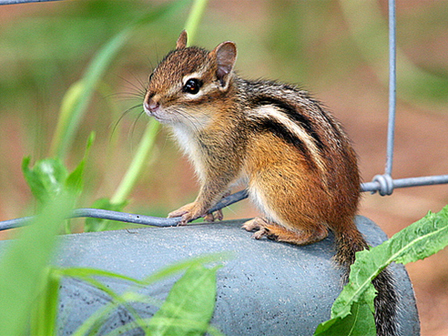Corporate Office:
20 Corporate Park Drive, Suite 150
Pembroke MA 02359
Cambridge, MA Office:
2534 Massachusetts Ave,
Cambridge, MA 02140
We all know they are cute and cartoon like. However they do have the propensity to be a serious pest for homes and businesses as populations grow.
Chipmunks are a small, brownish, typically ground-dwelling squirrel. They are approximately 5-6 inches long and weighs about 3-4 ounces. They are quite are easy to distinguish as they are so common. They have short, pointy heads marked with two white stripes, one above and one below the eye. They also have five black lines with white striping down the back. They sit upright and hold food with their front feet. They eat bulbs, seeds, fruits, nuts, green plants, mushrooms, insects, worms, and bird eggs.

The home range of a chipmunk may be up to 1/2 acre, but the adult only defends a territory of about 50 feet around the burrow entrance. Chipmunks are most active during the early morning and late afternoon and they are excellent climbers. Chipmunks favor areas with stone walls or rotting logs and heavy ground cover. They burrow, but excavate the soil (carry it away), so tunnel entrances are well groomed and often concealed. Their tunnel systems are often very extensive and have several entrances. They store food in their burrows. During winter, these animals enter long periods of torpor (inactivity), but do not truly hibernate. They have the ability to put up to 30 nuts in their cheeks and create a cache in their burrow of 5,000+ nuts.
Their lifespan is 2-3yrs in the wild. They have 1-2 litters of 4-5 young and they have two breeding seasons per year, February to April and June to August. They live solitary lives except when mating and they are fiercely territorial and have established hierarchies.
Chipmunks are not protected by federal law, but state and local regulations may apply. Exclusion, habitat modification and repellents are the best ways to minimize or eliminate chipmunk activity. Place bird feeders at least 15-30 feet away from buildings so spilled bird seed does not attract and support chipmunks. Repair stone walls. Remove clutter & debris (firewood, scraps, etc.). Clean up leaves. Limit ground cover plantings and low-lying bushes.
Have a pest that you Can Not identify?
We are here to help! Send us a photo at Secured Environments Pest ID or Contact Us!
*are required fields